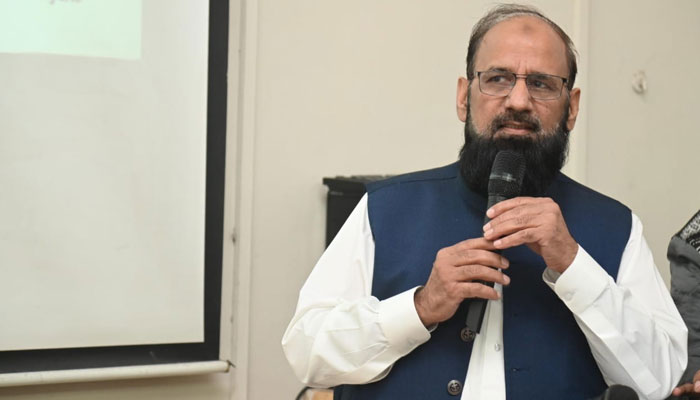Health equity stressed to achieve SDGs
LAHORE : Fatima Jinnah Medical University Vice Chancellor Prof Khalid Masood Gondal highlighted the need for strengthening capacities of health workforce from gender equality and health equity perspective if Pakistan is to achieve SDGs related to universal health coverage here on Sunday.
Speaking at a seminar on ‘Advancing gender equality, human rights and health equity mainstreaming across health sector in Punjab with WHO support’ at Lecture Hall 2, Dr Khalid Masood Gondal, said that equipping the health work force with necessary knowledge is key to advancing gender equality, human rights and health equity in health service delivery especially primary healthcare services if Pakistan is to achieve its SDGs related to universal health coverage.
He shared that multi-sectoral engagements and collaborations were needed to address social determinants of health approach to health equity. He acknowledged WHO support for reaching out to the academia engaging students and faculty for a great cause.
Keynote speakers included Head of Office WHO Sub Office Dr Jamshaid Ahmed, FJMU Alumni (UK) Dr Varda Shafi, senior faculty member Lahore College for Women University and broadcast journalist Dr Arsha Saleem Meer, WHO technical officers Dr Yahya Gulzar and Dr Irfan Ahmed, Head of Department Community Medicine FJMU Dr Taskeen Zahra, HEO District Health Authority Lahore Ms Tahira Maryam and academician Dr Shehla Akram. The event was attended by undergraduate MBBS and postgraduate students, nursing students, faculty members and health education team from district Lahore.
The event was part of the larger Global 16 Days Campaign of Activism (25 Nov to 10 Dec) to create awareness on human rights, International Day for the Elimination of Violence Against Women, rights of persons with disabilities, the anniversary of the Universal Declaration of Human Rights, World AIDS Day, inculcating other areas like health equity and equality.
Head of Office WHO Sub Office Dr Jamshaid Ahmed said, ‘Despite considerable achievements over the last decade, around half of Pakistan still does not have access to essential health services. Gender responsive, equity oriented and human right based approaches are needed to achieve targets of universal health coverage.’
WHO Technical Office Dr Irfan Ahmed shared national and international data on gender-based violence and its health implications, highlighting how access to essential health services was caused by barriers related to gender inequalities, discrimination and other social and economic factors.
-
 Chloe Kim Set For Historic Halfpipe Gold Showdown At Milano Cortina
Chloe Kim Set For Historic Halfpipe Gold Showdown At Milano Cortina -
 Brooklyn Beckham Gives Cold Response To Cruz's Olive Branch Amid Feud
Brooklyn Beckham Gives Cold Response To Cruz's Olive Branch Amid Feud -
 Woman Arrested Months After Allegedly Staging Husband’s Murder As Suicide
Woman Arrested Months After Allegedly Staging Husband’s Murder As Suicide -
 Senior US Politician Makes Formal Accusation Against Andrew As Woman Under Him Is Sex Trafficked
Senior US Politician Makes Formal Accusation Against Andrew As Woman Under Him Is Sex Trafficked -
 X Product Head Warns AI Spam Can Make IMessage And Gmail Unusable
X Product Head Warns AI Spam Can Make IMessage And Gmail Unusable -
 Tyler Childers, Wife Senora May Expecting Second Baby
Tyler Childers, Wife Senora May Expecting Second Baby -
 ‘Smiling Electrons’ Discovered In Earth’s Magnetosphere In Rare Space Breakthrough
‘Smiling Electrons’ Discovered In Earth’s Magnetosphere In Rare Space Breakthrough -
 Cardi B Airs Chilling Threat To Authorities Over Arresting Her Fans
Cardi B Airs Chilling Threat To Authorities Over Arresting Her Fans -
 Bangladesh Sees High Turnout In Landmark National Election
Bangladesh Sees High Turnout In Landmark National Election -
 Lufthansa Cancels Hundreds Of Flights Amid Pilot And Cabin Crew Strike
Lufthansa Cancels Hundreds Of Flights Amid Pilot And Cabin Crew Strike -
 Video: Prince Harry Tears Up Talking Of His Court Case & Children: ‘Don’t Feel Shame Even If A Judge Makes Demands'
Video: Prince Harry Tears Up Talking Of His Court Case & Children: ‘Don’t Feel Shame Even If A Judge Makes Demands' -
 King Charles Issues New Statement For ‘carers’ Two Days After Promising To Support Police Action Against Andrew
King Charles Issues New Statement For ‘carers’ Two Days After Promising To Support Police Action Against Andrew -
 Gene Simmons Makes Major Claim Against Rock & Roll Hall Of Fame
Gene Simmons Makes Major Claim Against Rock & Roll Hall Of Fame -
 Vladyslav Heraskevych Disqualified From Winter Olympics 2026 Over Helmet Controversy
Vladyslav Heraskevych Disqualified From Winter Olympics 2026 Over Helmet Controversy -
 Late James Van Der Beek Inspires Bowel Cancer Awareness Post Death
Late James Van Der Beek Inspires Bowel Cancer Awareness Post Death -
 ByteDance’s New AI Video Model ‘Seedance 2.0’ Goes Viral
ByteDance’s New AI Video Model ‘Seedance 2.0’ Goes Viral




